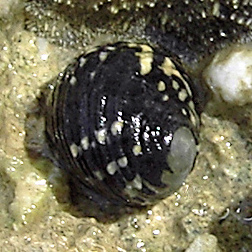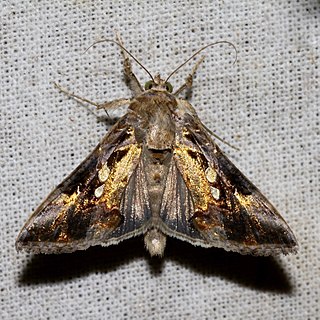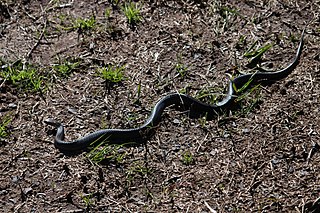
The flannel moths or crinkled flannel moths are a family of insects. They occur in North America and the New World tropics. The larvae are called puss caterpillars, and with their long hairs, resemble cotton balls. They have venomous spines that can cause a painful sting and inflammation lasting for several days. In some cases, the sting may cause headache, nausea, and shock-like symptoms. Perhaps the most notorious for stinging is the caterpillar of Megalopyge opercularis.

Nerita is a genus of medium-sized to small sea snails with a gill and an operculum, marine gastropod molluscs in the family Neritidae, the nerites.

Argyrogramma signata, the green semilooper, is a moth of the family Noctuidae.
Microrape is a genus of moth in the family Megalopygidae.
Ctenucha signata is a moth of the family Erebidae. It is found in Venezuela.

Hemiaspis signata is a species of venomous elapid snake endemic to Australia, where it is found along the east coast.

Urothemis signata, the greater crimson glider, is a species of dragonfly in the family Libellulidae. It is widespread in many Asian countries. A number of subspecies are recognized for this species.
Microrape camela is a moth of the family Megalopygidae. It was described by Walter Hopp in 1927. It is found in Colombia.
Microrape cristata is a moth of the family Megalopygidae. It was described by Walter Hopp in 1927. It is found in Brazil.
Microrape filata is a moth of the family Megalopygidae. It was described by Walter Hopp in 1927. It is found in Colombia.
Microrape gnathata is a moth of the family Megalopygidae. It was described by Walter Hopp in 1927. It is found in Peru.
Microrape hippopotama is a moth of the family Megalopygidae. It was described by Walter Hopp in 1927. It is found in Colombia.
Microrape simplex is a moth of the family Megalopygidae. It was described by Walter Hopp in 1927. It is found in Peru.
Microrape nivea is a moth of the family Megalopygidae. It was described by Walter Hopp in 1922. It is found in Bolivia.
Microrape santiago is a moth of the family Megalopygidae. It was described by Walter Hopp in 1922. It is found in Colombia.
Microrape jasminatus is a moth of the Megalopygidae family. It was described by Paul Dognin in 1893. It is found in Brazil, Bolivia and Ecuador.
Microrape minuta is a moth of the Megalopygidae family. It was described by Herbert Druce in 1886. It is found in Panama and Costa Rica.
Microrape shilluca is a moth of the Megalopygidae family. It was described by William Schaus in 1929. It is found in Brazil.

Tricholita signata, the signate Quaker, is a moth in the family Noctuidae described by Francis Walker in 1860. It is found in North America.
Hyperaspis signata is a species of lady beetle in the family Coccinellidae. It is found in North America.







